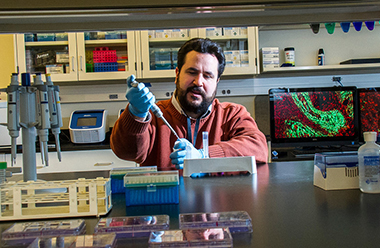Early Risers
First of four Early Career Faculty/Investigator Forums to boost the great ideas of new and early career faculty to be held Sept. 29.
 |
|
Breast cancer researcher Jason Herschkowitz of the School of Public Health and Cancer Research Center is an early career investigator who has received a National Institutes of Health award to aid the career a of promising cancer-research scientist. (Photo by Mark Schmidt) |
ALBANY, N.Y. (September 21, 2016) — Talented young scientists may mistakenly think they are not ready to go after major external support. On other hand, sometimes they’re raring to go but do so in a weak way. At times, they may even be reluctant to engage in collaborative projects, fearing that won’t count much toward tenure.
The Early Career Faculty/Investigator Forum, which kicks off on Thursday, Sept. 29, is dedicated to minimizing misconceptions and boosting the great ideas of new and early career faculty across UAlbany’s research community. Hosted by the Division for Research, the forum will be held four times annually to support junior faculty in the pursuit of extramural funding, fellowships, and career development awards.
Each forum will be held on a different UAlbany campus, with the first on the 29th taking place at University Hall in Room 110 from 3 to 5 p.m.
“To be successful at a major research university, faculty must obtain funding for their research and scholarship — that’s why supporting our faculty to obtain federal funding is mission critical for our Division,” said James Dias, vice president for research. “This forum will provide the face to face mentoring and sharing of best practices that should enhance our junior faculty’s competitiveness.”
Both Dias and Satyendra Kumar, associate vice president for research, a physicist who is leading the division’s grants development initiative, say that a prerequisite for having grant proposals accepted is the writing of clear and compelling grant applications that address relevant topics having clear beneficial societal outcomes.
This and other topics will be discussed by highly successful senior faculty and scholars who are participating in the Forum. They will share their insights as well as personal stories on the approaches and strategies they used and the challenges they faced in their career.
The Forum will regularly feature:
Networking/collaboration opportunities
Suggestions from peers on how to succeed in funding endeavors
Strategy discussions on early career investigator award programs
In-depth conversations about faculty research and scholarly development
Interactive faculty presentations and visiting lectures
Collegial discussion and community building
Among the recommendations that all junior faculty and researchers — including post-doctoral associates — will hear is that they need to get themselves out there. “Early career faculty should volunteer to serve on federal review panels in order to better understand the review processes and to understand why review panels consider some applications meritorious,” said Dias.
Another recommendation is to not shy away from collaboration.
“Federal agencies that fund organized research are calling for inter-disciplinary and trans-disciplinary research with translational and transformational outcomes,” said Kumar. “It is not likely that a junior scientist will have all the tools and expertise available to craft the most compelling and competitive grant application.
“Collaborations also have the benefit of increasing the reputation of young scientists —particularly if the collaborating laboratory has some gravitas — and brings to the table additional scientific and data input which makes the scholarship even stronger.”
Dias said that it is a misconception that collaboration weakens tenure opportunities. “Scholarship and external funding that are essential for tenure are more achievable with outstanding and meaningful collaborations,” he said. “And international collaborations bring a broader worldview as well as opportunities for international recognition. These are also important for tenure.”
Of course, there are pitfalls to collaborations, with review panels often having concerns about some long distance co-research projects, but the forum will present best practices for avoiding such errors.
If you would like to attend and receive more information about the Forum’s future programs, please RSVP by clicking: Join the Early Career Faculty/ Investigator Forum.
![]() For more news, subscribe to UAlbany's RSS headline feeds
For more news, subscribe to UAlbany's RSS headline feeds
A comprehensive public research university, the University at Albany-SUNY offers more than 120 undergraduate majors and minors and 125 master's, doctoral and graduate certificate programs. UAlbany is a leader among all New York State colleges and universities in such diverse fields as atmospheric and environmental sciences, business, education, public health,health sciences, criminal justice, emergency preparedness, engineering and applied sciences, informatics, public administration, social welfare and sociology, taught by an extensive roster of faculty experts. It also offers expanded academic and research opportunities for students through an affiliation with Albany Law School. With a curriculum enhanced by 600 study-abroad opportunities, UAlbany launches great careers.


